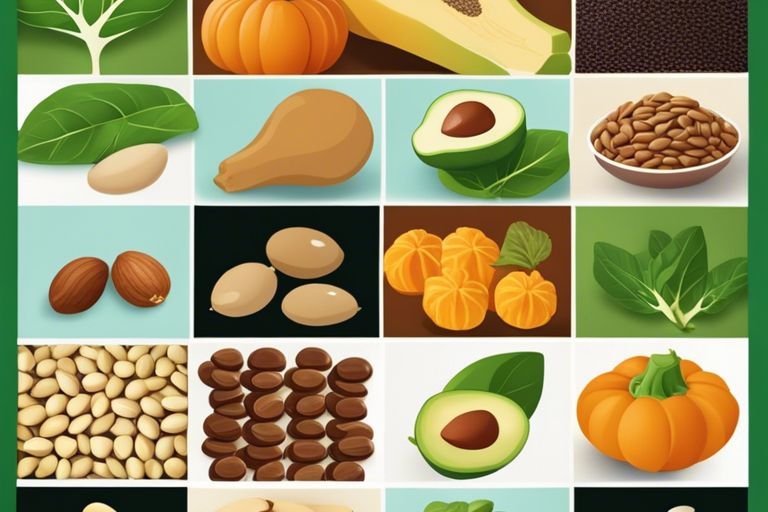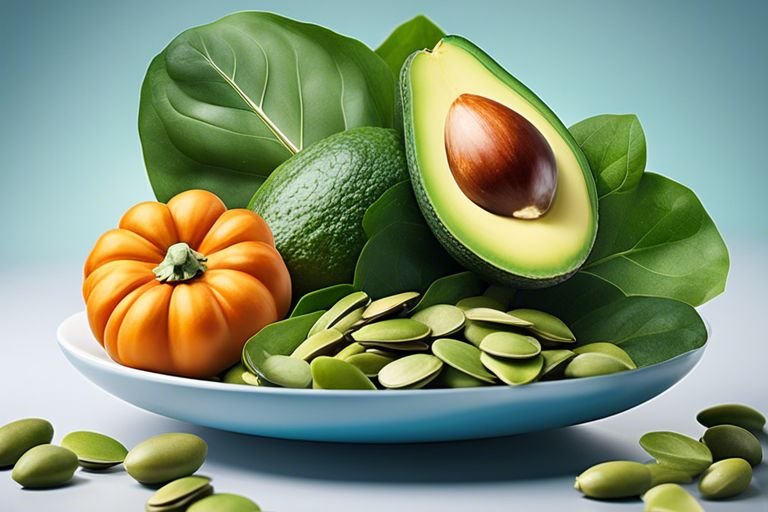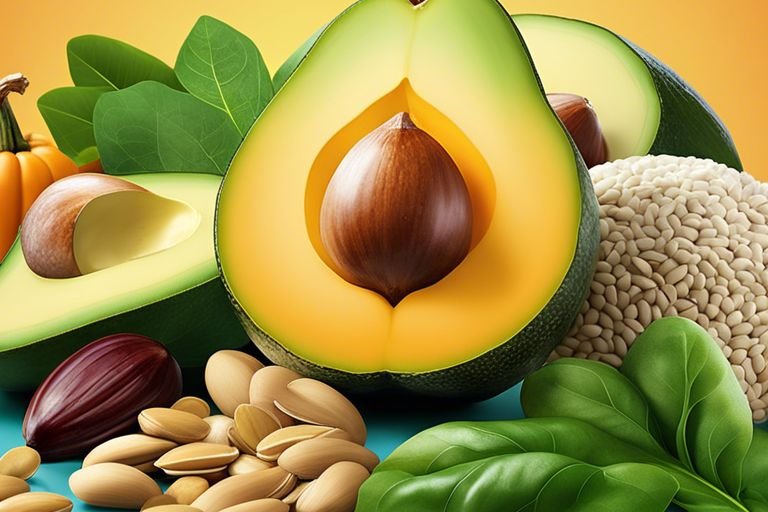There’s no denying the importance of magnesium in our overall well-being. From supporting muscle function to promoting heart health, this crucial mineral plays a crucial role in numerous bodily functions. In this article, we’ll explore the 11 best magnesium-rich foods that can help you prevent deficiency and improve your health. With a balanced diet incorporating these nutrient-packed options, you can easily meet your magnesium needs and thrive with vitality.
Key Takeaways:
- Magnesium-Rich Foods: Incorporating foods like spinach, nuts, fish, and whole grains into your diet can help prevent magnesium deficiency.
- Importance of Magnesium: Magnesium plays a crucial role in various bodily functions, including muscle and nerve function, energy production, and bone health.
- Enhancing Overall Health: Ensuring an adequate intake of magnesium through a balanced diet can contribute to improved energy levels, better sleep, and overall well-being.
The Importance of Magnesium
What is Magnesium?
On a biochemical level, magnesium is an imperative mineral that plays a crucial role in over 300 enzymatic reactions within the body. It is involved in energy production, protein synthesis, muscle function, nerve transmission, and bone development. Magnesium also helps regulate blood sugar levels and blood pressure, and it is necessary for the synthesis of DNA, RNA, and the antioxidant glutathione.
Why Do We Need Magnesium?
Magnesium is vital for overall health and well-being. Despite its importance, many people do not consume enough magnesium-rich foods to meet their daily needs. A deficiency in magnesium can lead to various health issues, such as muscle cramps, fatigue, irritability, and even more serious conditions like heart disease and osteoporosis. Ensuring an adequate intake of magnesium through diet and supplementation is crucial for maintaining optimal health and preventing deficiency-related symptoms.

Magnesium Deficiency: Causes and Symptoms
If you’re feeling fatigued, experiencing muscle cramps, or having trouble sleeping, you might be deficient in magnesium. Magnesium deficiency can occur when your body is not getting enough magnesium from your diet. This vital mineral is involved in over 300 biochemical reactions in the body, playing a crucial role in energy production, muscle function, and nerve signaling. Understanding the causes and symptoms of magnesium deficiency is key to maintaining optimal health.
Common Causes of Magnesium Deficiency
Causes of magnesium deficiency can include inadequate dietary intake, gastrointestinal issues that affect magnesium absorption, certain medications that deplete magnesium levels, excessive alcohol consumption, and conditions like diabetes or hyperthyroidism that increase the body’s need for this mineral. Additionally, factors such as chronic stress, intense physical activity, and aging can also contribute to magnesium deficiency.
Recognizing the Symptoms of Magnesium Deficiency
With respect to recognizing the symptoms of magnesium deficiency, it’s vital to pay attention to signs such as muscle twitches or cramps, fatigue, weakness, irritability, and difficulty sleeping. Other symptoms can include headaches, nausea, and loss of appetite. Since magnesium is critical for nerve and muscle function, a deficiency can manifest in various ways throughout the body.
Plus, magnesium deficiency has been linked to conditions such as high blood pressure, heart disease, and osteoporosis. If you suspect you may be deficient in magnesium, it’s vital to consult with a healthcare provider to determine the best course of action to address your levels and improve your overall health.
Top 11 Magnesium-Rich Foods
Your body relies on magnesium for over 300 biochemical reactions, making it an vital mineral for overall health and well-being. To ensure you meet your magnesium needs, incorporate a variety of magnesium-rich foods into your diet. Here are some top foods that are excellent sources of this vital mineral:
Dark Leafy Greens: Spinach and Kale
Dark leafy greens like spinach and kale are incredibly nutrient-dense and packed with magnesium. Just one cup of cooked spinach provides nearly 40% of your daily magnesium needs. These greens are not only rich in magnesium but also loaded with other vital vitamins, minerals, and antioxidants that support optimal health.
Nuts and Seeds: Almonds, Cashews, and Pumpkin Seeds
Seeds are a great source of healthy fats, protein, fiber, and magnesium. Almonds, cashews, and pumpkin seeds are particularly high in magnesium content. Incorporating a handful of these nuts and seeds into your daily diet can help boost your magnesium intake and provide other vital nutrients vital for your well-being.
Pumpkin seeds, in particular, are a nutritional powerhouse, offering not only magnesium but also zinc, iron, and antioxidants. Sprinkle these seeds on salads, yogurt, or enjoy them as a tasty snack to reap their numerous health benefits.
Legumes: Black Beans, Chickpeas, and Lentils
Legumes, including black beans, chickpeas, and lentils, are not only rich in plant-based protein and fiber but also excellent sources of magnesium. Adding these legumes to soups, stews, salads, or as a side dish can help increase your magnesium intake and support a healthy digestive system.
Another benefit of legumes is their versatility in cooking, making them a convenient and budget-friendly option for boosting your magnesium levels. Whether you’re a vegan, vegetarian, or omnivore, incorporating legumes into your meals can contribute to your overall nutrient intake and promote optimal health.
Whole Grains: Brown Rice, Quinoa, and Whole Wheat
Whole grains like brown rice, quinoa, and whole wheat are not only rich in fiber but also contain significant amounts of magnesium. These grains are nutritious and filling, making them a great addition to your meals to support energy levels and overall well-being.
Understanding the importance of whole grains in your diet can help you increase your magnesium intake and take advantage of their many health benefits. Swap refined grains for whole grains to boost your magnesium levels and enhance your overall nutritional status.
Fish: Mackerel, Salmon, and Tuna
Seeds
Fatty fish like mackerel, salmon, and tuna are not only excellent sources of omega-3 fatty acids but also provide a good amount of magnesium. Including these fish in your diet can help enhance heart health, brain function, and provide a significant portion of your daily magnesium needs.
Avocados
Seeds
Avocados are not only creamy and delicious but also rich in magnesium. These nutrient-dense fruits are packed with healthy fats, fiber, and vitamins, making them a versatile and nutritious addition to your diet. Adding avocados to salads, smoothies, sandwiches, or enjoying them on their own can help increase your magnesium intake and support overall wellness.
Bananas
Foods
Bananas are a convenient and portable snack that is naturally rich in magnesium. These potassium-packed fruits are not only delicious but also provide important nutrients like magnesium, vitamin C, and fiber. Including bananas in your diet can help regulate blood pressure, support muscle function, and boost your magnesium intake.
Dairy: Milk, Yogurt, and Cheese
Brown
Dairy products like milk, yogurt, and cheese are not only excellent sources of calcium but also provide magnesium. These dairy foods are vital for bone health, muscle function, and overall well-being. Choosing low-fat or non-fat dairy options can help you meet your magnesium needs while also supporting a healthy weight and balanced diet.
Herbs and Spices: Dark Chocolate and Cilantro
Now, let’s probe into some unexpectedly delicious sources of magnesium – herbs and spices. Dark chocolate and cilantro not only add a burst of flavor to your dishes but also provide a healthy dose of this vital mineral.
Dark chocolate is not only a decadent treat but also a surprisingly good source of magnesium. Just one ounce of dark chocolate with 70-85% cocoa contains about 64 milligrams of magnesium, which is around 16% of the recommended daily intake. So, next time you have a sweet craving, reach for a piece of dark chocolate to boost your magnesium levels.
Cilantro, also known as coriander in some parts of the world, is an herb that is commonly used in various cuisines for its fresh and citrusy flavor. Apart from its taste, cilantro is a good source of magnesium, with about 26 milligrams per cup of fresh leaves. Add a handful of cilantro to your salads, soups, or smoothies to not only enhance the taste but also increase your magnesium intake.
These two herbs and spices – dark chocolate and cilantro – are not only flavorful additions to your meals but also great sources of magnesium to help prevent deficiency and enhance your overall health.
How to Incorporate Magnesium-Rich Foods into Your Diet
Unlike Magnesium-Rich Food Information supplements, which can sometimes be hard on the digestive system, incorporating magnesium-rich foods into your diet is a natural way to boost your magnesium levels. Here are some delicious ways to add these necessary nutrients to your daily meals.
Breakfast Ideas
Foods high in magnesium can easily be incorporated into your breakfast routine. Try starting your day with a bowl of oatmeal topped with almonds and banana slices. You can also blend up a spinach and banana smoothie for a refreshing and nutrient-packed morning meal.
Lunch and Snack Options
Into your salads, add some pumpkin seeds or sunflower seeds for an extra magnesium boost. Snack on a handful of cashews or peanuts to keep your energy levels up throughout the day. Greek yogurt topped with chia seeds and berries is another excellent snack option rich in magnesium.
The key to incorporating magnesium-rich foods into your diet is to make them a part of your regular meal planning. By being mindful of your choices and opting for magnesium-rich options, you can ensure you are getting enough of this vital mineral to support your overall health.
Dinner Recipes
Any dinner can be enhanced with magnesium-rich ingredients. Consider making a quinoa and black bean bowl topped with avocado for a nourishing and satisfying meal. Salmon fillets with a side of steamed spinach provide a delicious way to get your dose of magnesium while enjoying a flavorful dinner.
Dinner doesn’t have to be complicated to be nutritious. By simply incorporating magnesium-rich foods like leafy greens, nuts, seeds, and whole grains into your meals, you can easily meet your daily magnesium needs and promote optimal health.
Additional Tips for Maximizing Magnesium Intake
Once again, incorporating magnesium-rich foods into your diet is imperative for maintaining optimal health and preventing deficiencies. To ensure you are maximizing your magnesium intake, here are some additional tips to consider:
Cooking and Preparation Methods
To preserve the magnesium content in foods, it is important to use cooking methods that do not deplete this mineral. Opt for steaming or sautéing vegetables instead of boiling them, as boiling can leach out magnesium into the cooking water. Additionally, try to consume magnesium-rich foods in their whole form whenever possible, as processing and refining can result in lower magnesium levels.
Combining Magnesium-Rich Foods for Optimal Absorption
Foods rich in magnesium are even more beneficial when paired with other nutrients that enhance magnesium absorption. For example, vitamin D and calcium work synergistically with magnesium to support bone health. Incorporating magnesium-rich foods like leafy greens with vitamin D-rich foods like salmon can help maximize the absorption of this imperative mineral.
The combination of magnesium-rich foods with sources of vitamin B6 and vitamin E can also aid in the body’s utilization of magnesium. These nutrients work together to improve magnesium absorption and utilization, further enhancing the benefits of a diet rich in magnesium.
Recognizing the importance of not only the quantity but also the quality of magnesium in your diet can help you optimize your overall health and well-being. By following these additional tips for maximizing magnesium intake, you can ensure that you are reaping the full benefits of this vital mineral for your body’s functions and systems.

Potential Interactions and Contraindications
Medication Interactions
After ingesting magnesium-rich foods or supplements, it is vital to be aware of potential interactions with certain medications. Magnesium may interfere with the absorption of antibiotics, bisphosphonates, and some medications used to treat hypertension. It is recommended to consult with a healthcare provider before starting magnesium supplementation if you are taking any medications to avoid any potential adverse effects.
Health Conditions and Magnesium Supplementation
Contraindications for magnesium supplementation include individuals with kidney problems, as excess magnesium can accumulate in the body and lead to further complications. For those with a history of heart block or myasthenia gravis, it is crucial to seek medical advice before increasing magnesium intake, as it can potentially worsen these conditions. If you have any underlying health concerns, it is best to consult with a healthcare professional to determine the appropriate dosage and form of magnesium to avoid any negative effects on your health.
A balanced approach is key when considering magnesium supplementation, as too much or too little of this vital mineral can have detrimental effects on your health. It is always recommended to prioritize obtaining nutrients from whole foods and speak with a healthcare provider before adding supplements to your daily routine, especially if you have pre-existing health conditions.
Final Words
Taking this into account, incorporating magnesium-rich foods into your diet can not only help prevent deficiency but also enhance your overall health. With a wide variety of delicious options like leafy greens, nuts, and seeds, there are plenty of ways to ensure you’re getting an adequate amount of this vital mineral. Remember to consult with a healthcare professional if you suspect you have a magnesium deficiency or are considering taking supplements to meet your needs.
FAQ
Q: What are the benefits of consuming magnesium-rich foods?
A: Consuming magnesium-rich foods can help prevent magnesium deficiency, support bone health, regulate blood sugar levels, improve heart health, and alleviate muscle cramps and spasms.
Q: What are some delicious sources of magnesium?
A: Some delicious sources of magnesium include dark leafy greens like spinach and kale, nuts and seeds such as almonds and pumpkin seeds, whole grains like quinoa and brown rice, and fish like salmon and mackerel.
Q: How can I incorporate more magnesium-rich foods into my diet?
A: You can incorporate more magnesium-rich foods into your diet by adding nuts and seeds to your salads, smoothies, or oatmeal, including dark leafy greens in your soups, stir-fries, or sandwiches, swapping your regular rice for quinoa or whole grain rice, and enjoying fish as a main dish or in a salad.
